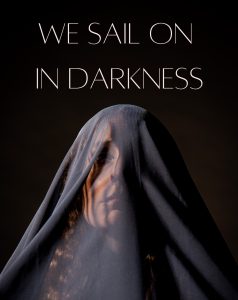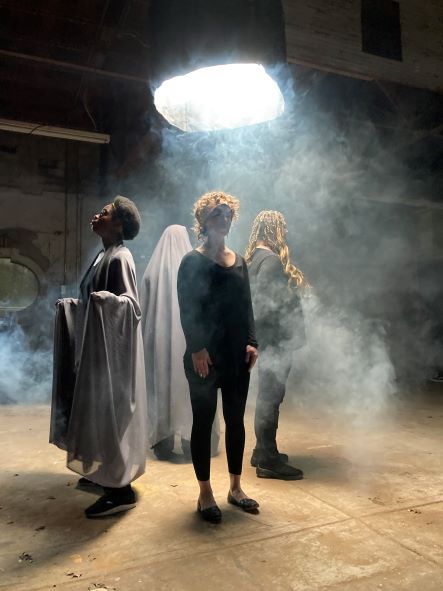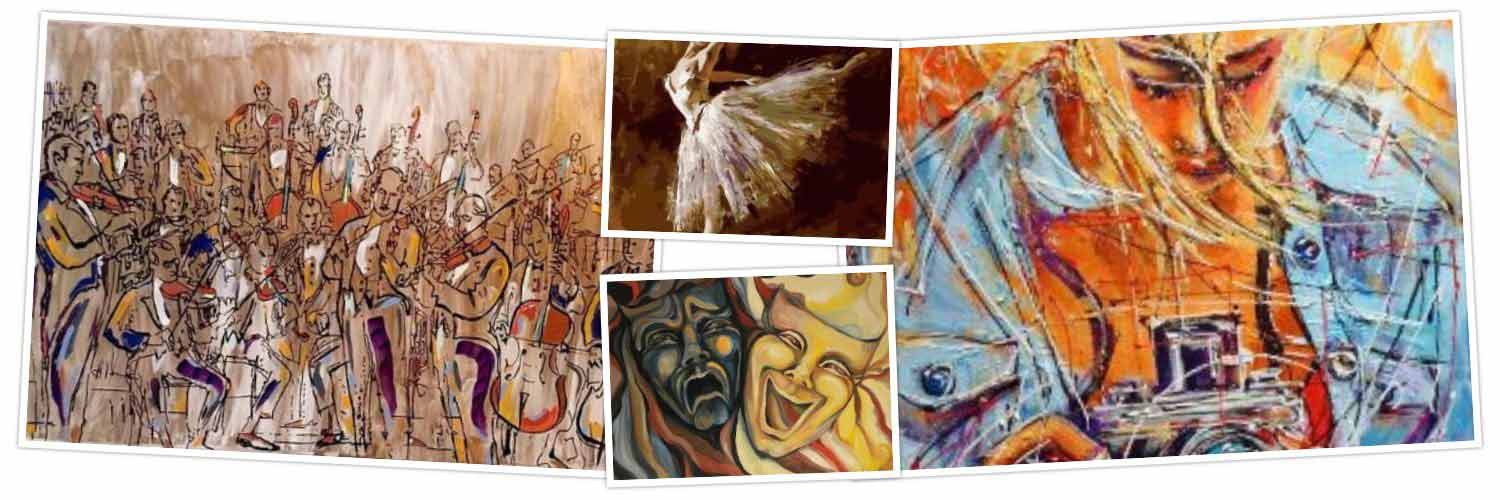New Play Explores Stories of Female Mystics Using Physical Theater Style
By JASMINA WELLINGHOFF, Editor
Theater is a normally a hybrid of spoken word and action, but a growing interest in “physical theater” greatly emphasizes the physical action at the expense of the traditional scripted dialogue. If you would like to experience a physical theater show, you’ll have an opportunity to do so when a new work, “We Sail On In Darkness” opens next Thursday at St. Mark’s Episcopal Church downtown.
The show is conceived, produced and directed by Ruthie Buescher, a new San Antonio resident, who specializes in physical and “devised” theater. Thematically, the play focuses on the stories of several women who were Christian mystics in centuries past, delivered primarily through the format of physical theater.

We asked her to tell us about the genesis of the work.
“My background is in theater, in something called ‘devised theater,’ a form of theater that pulls in a lot of different types of theater-making, like physical theater and improve, to create new works that are created by the ensemble of actors,” she explained in a recent interview. “You start with an idea rather than an actual script, and build the piece from the ground up. It’s a different way of creating. You never know what you are going to end up with. This is what I have been doing for about ten years.”
With “We Sail on in Darkness” she has returned to more conventional playwriting though the staging still relies on organic developments that emerged from the ensemble work through rehearsals.
“I wanted to write about women, and I was interested in female mystics. I knew about some of them from my experience of growing up in the church, but then I started researching female mystics and came across the Desert Mothers and others, and decided that it would be interesting to write a piece about several of them.”
The mystics featured in the play include the relatively well-known Hildegard of Bingen, who dedicated her life to reforming the Catholic Church and wrote about her various experiences, but also the virtually unknown Perpetua who was killed by a Roman soldier wielding a sword because she refused to denounce her faith. She was born in 182 and died a martyr in 203.
Other mystics in the play are Julian of Norwich, an Englishwoman who wrote “The Revelations of Divine Love; Angela of Foligno, who lived in the 13th century and the aforementioned Desert Mothers who voluntarily spent time alone in the desert seeking divine enlightenment.
“Some of these women contributed a lot, not just to the history of the church, but also to the history of literature, music and theater, but people don’t know their names, for the most part,” said the playwright. “Many of our actresses said ‘I’ve never heard about any of these women yet they sound so interesting.’ Uncovering their stories was what I was really interested in. The only one I was familiar with was Julian of Norwich because I was an English major and we studied her in our medieval literature classes. She is credited for writing the first literary work by a woman in the English language. Hildegard of Bingen wrote what is considered the first morality play for the theater in the Middle Ages. And she had an influence on sacred music. And Perpetua recorded some of her thoughts and experiences as well.
In fact, the more Buescher dug into the stories of these women, the more she realized that they share similarities, not just because they were all under the Catholic umbrella but also because of their experiences with suffering, which are very similar, building on each other and speaking to each other in a way the playwright found ”compelling.”

Each mystic’s suffering in the play represents a different form of suffering – suffering of the body, suffering of the mind, suffering at the hand of others, and frief caused by the suffering of others.
Theatrically, their lives are intertwined.
“The words of the mystics are central to the play… but interpreting their journeys through the lens of physical theater felt like the perfect way to blend visions and reality across time,” emphasized the playwright.
That complex tapestry of history and story-telling is supported by an original arrangement of music by another San Antonian, Ruth Moreland – that includes selections from Hildegard of Bingen’s music and oud-based* musical segments – and by choreographer, Tanesha Payne who is in charge of all that expressive movement. The stage will be multi-levelled, and as indicated above, characters will interact with each other. The four mystics will be portrayed by Cynthia Neri (Julian of Norwich); Michelle Bumgarner (Angela of Foligno); Courtney Johnson (Perpetua) and Katrin Blucker Ludwig (Hildegard of Bingen). Four other actresses play the Desert Mothers, but their names were not included in the press release. The sole male actor, Benjamin Watson, will play all the male parts.
——————————————————————————————————-
“We Sail on in Darkness,” Feb. 9-18 (times vary); St.Mark’s Episcopal Church, 315 E. Pecan St., tickets $25 but there is a Pay-What-You-Want performance on Feb. 16; https://www.wesailonindarkness.com
* Oud is a Persian lute-like string instrument.
